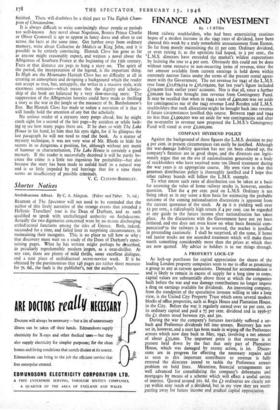FINANCE AND INVESTMENT
By t USTOS
HOME railway stockholders, who had been entertaining cautious hopes of a modest increase in the 1945 rates of dividend, have been cheered this week by a truly remarkable announcement from Euston. So far from merely maintaining the 21 per cent. Ordinary dividend, or even raising it, as the optimists had hoped, to 3 per cent„ the *.L.M.S. directors have exceeded the market's wildest expectations by hoisting the rate to 4 per cent. Obviously this could not be done without some recourse to non-recurring items of revenue, since the net amount available from current earnings is held down within extremely narrow limits under the terms of the present rental agree: ment with the Government. The net revenue for 1945 of the L.M.S. rose from £15,679,214 to £16,219,000, but last year's figure included• £519,000 from earlier years' accounts. Nor is that all, since a further £5oo,000 has been brought into revenue from Contingency Fund. It may be recalled that when in 1944 a sum of L400,000,was set aside for contingencies out of the 1943 revenue Lord Royden told L.M.S. stockholders that such allocations might be brought back into revenue if future circumstances justified this course. Between 1940 and 1944 no less than Li,9oo,000 was set aside for war contingencies and after the re-transfer to revenue now proposed the L.M.S.'s Contingency Fund will stand at over L2,000,000.
COMPANY DIVIDEND POLICY
Against the background of these figures the L.M.S. decision to pay 4 per cent. in present circumstances can easily be justified. Although the war-damage liability question has not yet been cleared up, the company's finances are in good shape, and the directors can legiti- mately argue that on the eve of nationalisation generosity to a body of stockholders who have received none too liberal treatment during the war years is an appropriate course. My own view is that this generous distribution policy is thoroughly justified and I hope that other railway boards will follow the L.M.S. example.
To what extent such rates of distribution can be taken as a basis for assessing the value of home railway stocks is, however, another question. That the 4 per cent. paid on L:M.S. Ordinary is not being taken as in any sense a .firm basis for estimating the probable outcome of the coming nationalisation discussions is apparent from the current quotation of the stock. At 29 it is yielding well over 13 per cent:, a ridiculotisly high return if 4 per cent. can be regarded as any guide to the future income after nationalisation has taken place. As the discussions with the Government have not yet been initiated, and one does not even know on what basis financial com- pensation•to the railways is to be assessed, the market is justified in proceeding cautiously. I shall be surprised, all the same, if home rail junior stocks are not accorded treatment which will make them worth something considerably more than the prices at which they are now quoted. My advice to holders is to see things through.
A PROPERTY LOCK-UP As lock-up purchases for. capital appreciation the shares of the leading London property companies seem to me to offer as promising a group as any at current quotations. Demand for accommodation is and is likely to remain in excess of supply for a long time to come, capital values are substantially above those at which the companies built before the war and war damage contributions.ho longer impose a drag on earnings available for dividends. An interesting company, from the standpoint of the speculative investor willing to take a long view, is the United City Property Trust which owns several modern blocks of office properties, such as Regis House and Plantation House, in the City. Before the war it regularly earned over io per cent. On its ordinary capital and paid a 71- per cent, dividend and in 1936-37 the Li shares stood between 25s. and 305.
During the war the company's fortunes inevitably suffered a set- back and Preference dividends fell into arrears. Recovery has now set in, however, and a start has been made in wiping off the Preference arrears which now date back to May, 1942, involving a net amount of about L35,000. The important point is that revenue is at present held down by the fact that only part of Plantation House, which was damaged by enemy action, is let. Discus- sions are in progress for effecting the necessary repairs and as soon as this important contributor to revenue is fully restored the directors intend to tackle the Preference arrears problem on bold lines. Meantime, financial arrangements are well advanced for consolidating the company's debentures and mortgages by means of a scheme which will effect a useful saving of interest. Quoted around 2IS. 6d. the Li ordinaries are clearly not yet within easy reach of a- dividend, but in my view they are worth putting away for future income and gradual capital appreciation.


























 Previous page
Previous page